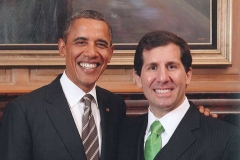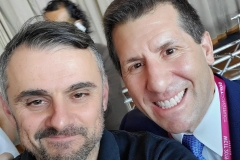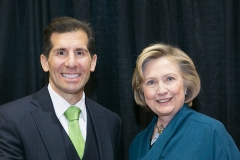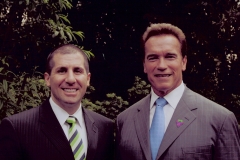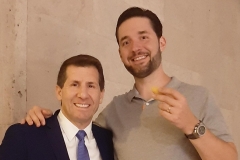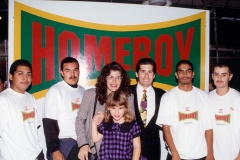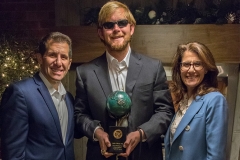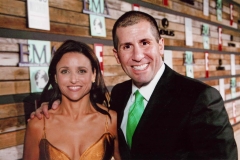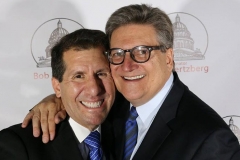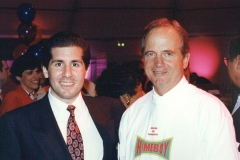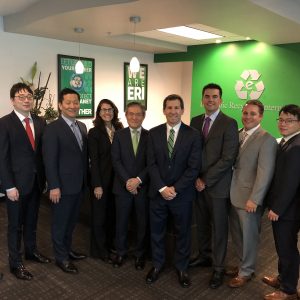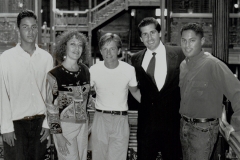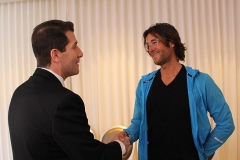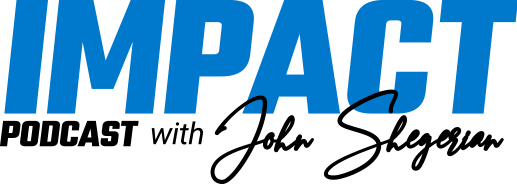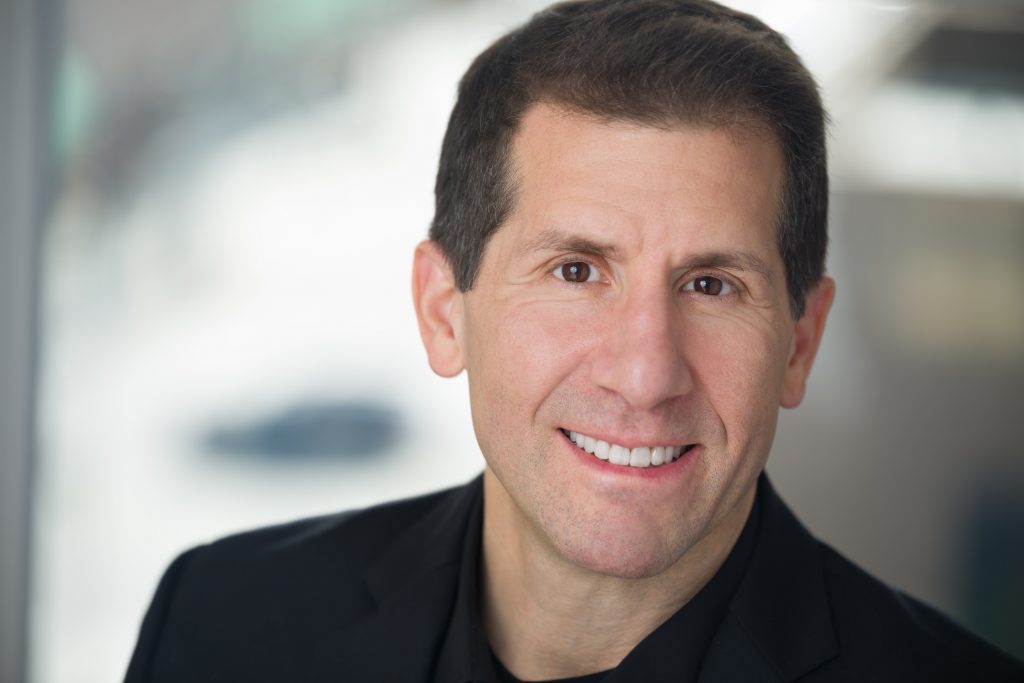
Podcast Excerpt [00:00] Entrepreneurs are people, like all of us, just men and women who go through their daily lives and they see the world as a series of voids, things that are missing, things that could make their life more frictionless. So if you start then accumulating the voids that are more personal to you and then assessing them in terms of scalability, if you solve that, or fill that void, the benefit it would have to others – that’s how I really go through it.
Introduction [00:37] Welcome to the Plant-Based Entrepreneur Show with your host Jerry Sever.
Jerry Sever [00:46] Hey, this is Jerry Sever. You’re listening to Episode 52 of the Plant-Based Entrepreneur Show, the podcast where we go in-depth and behind the scenes with the people creating a plant-based future so you can get inspired, learn from their experience and their approach, and find out what works when you’re setting up your own vegan company or brand.
I’m really excited about today’s episode because we’re going to be touching on something that I believe should be part of the foundation of any successful business. I know that it is for me, even though there are still a lot of people who don’t that see it that way. I’m talking about sleep.
To be completely transparent, my own background is that I used to believe that I perform at my best when I get five to six hours per night. Looking back, I couldn’t have been more wrong. It was a long learning process for me to readjust my work habits and just get to the point where I sleep for seven hours or more, but one thing that still causes me problems is falling to sleep fast. That doesn’t have so much to do with my past habits than it does with just the way that my mind is wired because as soon as my head hits the pillow my brain starts buzzing and it’s actually been like that since I was five or six years old.
So anyway, because of this, I was really interested when I heard about the brand that John Shegerian co-founded called Som. Their product is a drink that mixes a number of ingredients in a way to help your body to get from awake to sleeping as fast as possible. It’s like the counterweight to all the energy drinks that are available today, but unlike most of those, this one is completely natural and it’s vegan to boot.
Speaking of John, he’s a serial entrepreneur whose life mission is creating companies that improve the world and he’s been a podcast host himself on an environmental and sustainability talk show called Green is Good, so I’m really grateful for this opportunity to pick his mind and share it with you.
John, welcome to the Show.
John Shegerian [02:54] Jerry, it’s an honor and privilege to be here. I love what you’re doing. I love the mission that you’re on and I love the message that you’re spreading, so I’m just happy to be here with you today.
Jerry Sever [03:06] Well, the feeling is absolutely mutual. Thank you very much for that praise because, like I said before, it means a lot coming from you. I’m sure that some people listening to this will know you from Green is Good, but for others and just to give a better understanding of who you are, what’s the one thing that people should know about you going into this interview?
John Shegerian [03:34] I think it’s more fun for me to be on the other side of the mic! I like to be doing the interviewing and asking the questions rather than answering them. I’m happy to answer them, and as I said, it’s an honor to be here today, but I’m so curious and people’s lives are so interesting and people’s journeys and stories are so fascinating, that what goes into making great and people who create great things that make the world a better place, I’m always fascinated and curious about that. That’s why I had Green is Good radio for almost eight years and did about a thousand shows. It was one of the most fun journeys I ever had in my life. I really enjoyed that side of the mic. So I’m a little bit envious of you today, but like I said, I’m pleased and honored to be here nonetheless.
Jerry Sever [04:32] I can totally to relate to that feeling because this part of doing it, learning about how things are built and what makes people tick, it’s definitely one of the most fun parts of this job for me as well. I really hope you don’t mind being on the other side of the microphone, because I definitely think you’re one of those people who has a lot to share and that a lot of people can learn a lot from.
John Shegerian [05:01] Thank you, and like I said, it’s great to be here and it’s going to be fun today.
Jerry Sever [05:06] Yes, cool. So, taking it far back, where did it all start? I mean for you personally are there things when you were growing up that you can point at and say, look this is what put me on the path that I am today?
John Shegerian [05:22] Yes, I grew up in very humble beginnings in Queens, New York in a little town called Little Neck Queens New York, which was an interesting part of New York that not a lot of people understand unless you’re a native New Yorker. It’s part of New York City proper, it also happens to be on Long Island, and it’s also in Queens. So I had the best of all in terms of where I grew up and my household.
My mom was a Social Worker, she had her Masters in Social Work and she dedicated her life to, and still does by the way, to doing that kind of work helping others get better mentally. My dad was an immigrant entrepreneur. So when those collide, you never realize that when you’re living it, but as you look backwards I had an entrepreneur, I had a social worker. It’s probably not that farfetched to believe that I would grow up to be a social entrepreneur. That’s sort of the beginnings of the influence that was always being imparted on me by my parents. My dad was a very hard worker and was tenacious in terms of his entrepreneurship. When he was 18 and 19 years old he worked at a gas station pumping gas. He never got formally educated and by the time he was 30 or 31 he was a self-made millionaire. My mom was always challenging herself mentally, furthering her education, doing good in all of her work and she continues to do that work and continues to challenge all of us in the family to constantly remain curious and to keep learning. Those are some great lessons from my two parents.
Jerry Sever [07:17] It definitely seems like the ideal recipe for just gifting you with this drive to do good with business in pretty much everything that you do, right?
John Shegerian [07:30] Yes, it does. What happened is my dad had a love for horses and so I fell in love with horses as well and I wanted to grow up, when I was 10 or 11 years old, to be a horse jockey, but I was already too overweight to be such a jockey so I set my sights differently. I said ok, if I can’t be around racehorses as a jockey, then I’ll be around racehorses as a driver, a person who sits behind racehorses in what is called a sulky. So I turned my goals to that and I became one of the youngest professional racehorse drivers and trainers of standardbred racehorses at 15 and 16 years old in America. That was a whole different lesson, Jerry, in terms of a) when you set your sights on a goal that you could actually achieve them, b) hard work does pay off, and c) horses were amazing animals. Beautiful lovely creatures that were put here on this earth to be with us, but they depended on us.
So it also taught me the great lessons of accountability and responsibility which are critical for any form of good entrepreneurship. Between my parents and my experience with racehorses and the success I had in that industry, it was a great beginning of my formative years.
Jerry Sever [09:11] How big of a step was it from racing horses to starting your own business?
John Shegerian [09:16] Racing horses is really starting your business because you are a businessperson. You have to raise money to buy horses or have people trust you with those horses and then you have to run the stable. Running the stable was a business enterprise and I was doing that as a teenager.
I wasn’t thinking about it as entrepreneurship then, I was just thinking about it as doing what I loved, but that sort of becomes then the theme of great entrepreneurs. Those who find things that are so personal to them that it becomes their passion and their purpose so they’re not thinking of it while they’re doing it. They’re just doing it and doing it with their heart, their soul, and everything they’ve got.
So that was sort of the whole journey, it started then of being a business person and realizing what goes into good entrepreneurship.
Jerry Sever [10:15] Yes, this was going to be the next thing that I asked because we could go through the entire list of businesses that you’ve created, but I really wanted to know what’s your approach to picking ideas? Because for some people it’s just looking for problems that no-one’s solved, for some people it’s solving their own problems, and then for some people, it’s just going by their own passions. Then, of course, there are mixtures of everything. I get the impression that you’re the kind of person who works from his own passions.
John Shegerian [10:51] Yes, it’s a great point. Sometimes things just fall into your lap and that eureka moment happens, and some things you seek out a little bit more. But ultimately great entrepreneurs are people, like all of us, just men and women who go through their daily lives and they see the world as a series of voids, things that are missing, things that could make their life more frictionless. Now, some of those voids are personal to them, and some are not. So if you start then accumulating the voids that are more personal to you and then assessing them in terms of scalability, if you solve that, or fill that void, the benefit it would have to others – that’s how I really go through it.
I have to find a void and it has to then be personal. Then I also have to understand that if I spend my time on it, is the result going to be able to do the most good for the most people at that moment in my time of my life and where we are as a society at that given time. That’s how I approach it.
Jerry Sever [12:11] So that final step that you mentioned, the evaluating whether you’re going to make the most impact, I think that one’s really important when you’re deciding. Often, I think, especially for the kind of people who see these voids and who are also passionate about a lot of things, it can be a bit of a struggle deciding where to focus their energy. I think evaluating where is the best use of your time and energy, that’s a very important step.
John Shegerian [12:42] Yes, and then when I look at the compendium of businesses that I’ve either co-founded or was a part of, starting back at Homebody Industries after the Rodney King riots with Father Greg Boyle, that was born out of a need. Nothing good at that given time in Los Angeles history was happening in terms of business and bridges being built across different races, across different cultures. I saw him on 60 Minutes and invited him to our Grand Central Market in downtown LA and showed him a tortilla stand that had vacated by a tenant that didn’t want to live in LA anymore. We literally started Homeboy Industries by first creating Homeboy Tortilla in the Grand Central Market. We did that first and then a lot of publicity came because that was one of the few businesses that was succeeding that was born out of the riots, but that was succeeding in a post-riot Los Angeles. The news media took up on it and then more donations came in and the greater good was able to be done in terms of other businesses, such as a bakery, tattoo removal and graffiti removal that Father Greg Boyle was able to effectuate and continues to run brilliantly.
Jerry Sever [14:07] Just to give this a little bit of context for anyone who might not be familiar with this – what is Homeboy Industries, and what were Homeboy Tortillas?
John Shegerian [14:16] Basically it was born out Father Greg Boyle’s, what he called, Proyecto Pastoral in East Los Angeles at the Dolores Mission. It was his vision to put gang-impacted youth to work because if they didn’t have opportunities like other youths in society they were going to potentially be brought into and initiated into gangs and be forced to do things that were negative to them and to their own families. So his tagline, his pitch – elevator pitch let’s just call it in entrepreneurial terms – still rings true today maybe more than ever. What his tagline was for Homeboy when we started it with Homeboy Tortillas, and he started it before that in East LA with his organization at the Dolores Mission, was nothing stops a bullet faster than a job.
Jerry Sever [15:27] Nice.
John Shegerian [15:28] He was really, really, so forward thinking and, as I said, all these years later, twenty-five years or so later, those words still ring so true and the more than we can do to support great organizations like Homeboy Industries the better we’ll all be able to leave the world and make the world a better place.
So it was that experience of co-founding a venture with Father Greg Boyle that I realized a couple of things: a) you could actually create a business that not only makes money but also impacts your community and society just more than the dollars and cents. The impact that we had and the inspiration that it created, and still continues to create to this day, has been massive. I realized at that point I never wanted to just go and do any new ventures after I exited that just to make money. Everything I did post Homeboy Tortillas and Homeboy Industries also had to have a social bottom line and we also had to make the world a better place besides making just dollars and cents.
Jerry Sever [16:52] So what was the next step for you after that?
John Shegerian [16:54] I started in 1998, which again seems like forever ago, and to give your listeners some context it was the year Google was founded. I started a dot-com called financialaid.com and we, my partners and myself, we set out to democratize student lending online and make it as seamless and as easy as possible. We were thrown out of every venture capitalists office. We were rejected everywhere we went for money until we ended up in a friend’s father-in-law’s office. His father-in-law and brother-in-law were doctors and they liked the idea. I signed a note to them. I personally guaranteed the money they invested into financialaid.com on the back of a prescription pad!
Again, it always reminds me when I share that story that after being rejected by so many venture capitalists, and Jerry, it was such an experience. If you can imagine in 98, the year Google was founded, most of the venture capitalists told my partner and myself what do you guys know about the internet. We can’t invest in you. I wish I was back in their office today, Jerry, telling them what do you guys know about the internet? The world was just beginning online with Google just being founded, it was basically ground zero.
Jerry Sever [18:26] That was actually just slightly before the whole dot-com craze started, 98.
John Shegerian [18:32] Yes, it was. So we got the doctors to invest and a couple of other people invested as well, other friends, and off we went. We eventually became, over six years or so, the most successful online student lender out there. We really did democratize student lending. We didn’t charge the parents or the students. We gave them Stafford loans, consolidation loans, and PLUS loans and we also put up a grant and scholarship search as well. Again, we tried to make it information-rich, took no advertising dollars, advertisers that of course wanted those eyeballs. We really set out to do what our goal was and it was a very positive experience with really great people.
Again, we were able to help people get connected to finances so they could either consolidate their loans and cut down on their expenses, or they could find loans to go from high school to college, or from college to graduate school. The people that we were able to benefit and further the greater education cause in this great country in the United States not only was an honor, but it felt good every day to do what we were doing.
Jerry Sever [19:54] On the topic of creating socially responsible brands and brands that make an impact but also make a profit, what are some of the essentials that you really need to keep at the front and center when you’re setting up something like that?
John Shegerian [20:15] Well, let’s go to number one, number two and number three. Number one is make a profit. Number two is make a profit. Number three is make a profit. It’s easy to get lost in the mission, Jerry.
Jerry Sever [20:30] In talking about the mission do you mean the impact that you want to make?
John Shegerian [20:34] The impact, yes. It’s easy to get intoxicated with the social impact, but if we forget the bottom line we’re not going to be able to ultimately achieve the goals that we set out to make.
So, if you really want to create impact and make the world a better and more sustainable place you have to create a sustainable business model. What I mean by sustainable business model is a profitable one.
Jerry Sever [21:05] I think that’s a very important lesson that pretty much every vegan entrepreneur out there should take to heart because, I completely agree with you, when you’re doing something that you know has an impact – you called it intoxication, I understand what you mean there. It’s kind of feeding yourself the story that you’re doing something good so it doesn’t matter if you’re barely scraping along, but you’re 100 percent correct, the larger the bottom line in terms of profits the bigger the impact that you can ultimately create.
John Shegerian [21:43] That’s exactly right. So for all of the vegan entrepreneurs out there that are at some point during their startup or scaling, that paying attention to that bottom line is really, really critical.
Jerry Sever [22:00] So, let me just flip this around, because I’m pretty sure that people will be wondering about this, is it also … or better yet, how do you make sure that you don’t get intoxicated or lost in the numbers?
John Shegerian [22:18] Yes, it’s finding the balance. There’s so many great examples now. When we were starting Homeboy Tortillas and Homeboy Industries social entrepreneurship wasn’t part of our vernacular, our lexicon. Now, I can’t think of a university in America that doesn’t have either a discipline in it or courses on it and teachers that specifically are focused on that and professors and experts that are focused on it because we have so many great role models now. Whether that’s Warren Buffet, whether that’s Bill and Melinda Gates, whether that’s Mark Zuckerberg or Sean Parker, Oprah Winfrey – there’s so many great entrepreneurs that have taken their platform, taken the capital that they’ve worked very hard for and most of the time from scratch, from nothing, from the standing start and they’ve put it to amazing use to make the world a better place.
So it’s finding the right mix for that person, for that entrepreneur, or for that entrepreneurial group, but make profit and you can sustain your business and you don’t get carried away with all the benefits that come from making a little extra money and having more than you had before than you started the venture. Stay humble and focus on the mission and the impact as well. That balance is a constant adjustment every day, every week, every month, every year, but it’s one that’s important to constantly self-evaluate.
Jerry Sever [23:57] Yes, and I have to mention on the topic of social entrepreneurship and making an impact, I’m really looking forward to the next interview that we’re going to be airing after this one, so in two weeks’ time is a brilliant vegan entrepreneur from Canada. One of the things that she mentioned is that for a brand today you can get by with not making an impact, not being socially responsible. In five or ten years’ time, if you start something up and you’re not including this in your mission, you’re going to be dead in the water. I’m not sure about the timeframe, but I can completely see that happening and being even more important in the future.
John Shegerian [24:48] I would fantastically agree with those sentiments.
Jerry Sever [25:52] Yes. So, the student loan business, that was completely internet based, how much of this – and I’m talking about the socially responsible business – how much of it has changed with the evolution of internet?
John Shegerian [25:09] Well, it’s changed a lot. When I start thinking about starting Homeboy no one came to buy our tortillas until my wife’s good friend from USC, who she went to USC with and I think was her roommate, Sylvia Lopez came and did a story on us. Sylvia was then a reporter in Los Angeles. So it was the electronic media then and the print media that reigned supreme back them. Sylvia came and did a story. Back then CNN was so fresh and new what they would comb is they would comb the local newsfeeds for big stories, potentially big stories that had bigger impact and needed more visibility. So they picked up the story and they ran the story before you knew it. So you had the local news do it, and then CNN, and then before you know it, you’ve got a brand in the making.
With financialaid.com we had a little bit of media, traditional media, but mostly it was online marketing. It was we were marketing on sites that were sort of the original sites. We were marketing on CNN.com and weather.com and yahoo.com and that’s how we made our brand known back then. When I sold financialaid.com we had never bought an ad offline. We never bought a newspaper ad. We never bought a billboard. We never bought a television ad. That’s why we stayed in business compared to what you saw with Webvan and pets.com and all the other fantastic unicorn brands that raised billions of dollars and went out of business. We didn’t buy a Super Bowl ad. We just stuck … we stayed hyper-focused, we kept our head down and stuck to our knitting and what we knew well and we’d learned how to do – online marketing.
April 2005 came and I wanted to climb a new mountain and my partners and I, new partners and I, started ERI – Electronic Recyclers International – and it was a whole new marketing and getting the word out. It was a whole other reset. You had to do what I call the law of convergence – some offline marketing, online marketing, traditional media, and all together those would come together to build a brand.
My point to you, Jerry, is from Homeboy to Financial Aid to ERI and now to the latest brand that we launched recently, it’s constantly re-setting and you have to reset with it and not get stuck in one as the only way. There’s no such thing as a silver bullet now to building a brand from a standing start to getting visibility, traction, and scale. It takes literally a convergence of methodologies and ideas and you have to learn to master and remaster them as society changes and awareness methodologies change as well.
Jerry Sever [28:22] So what I’m hearing here is that even though all of these brands have points in common, and that being the impact that they’re making, you are essentially re-learning the ropes with each new business that you launch.
John Shegerian [28:40] You said it better than I could, and that’s exactly the reality.
Jerry Sever [28:44] So, like I said, we could list the companies that you’ve started or co-founded and I don’t know if the ones listed on your LinkedIn profile if that’s the right number or not, but how many are there actually?
John Shegerian [29:01] There’s Homeboy, and then there’s financialaid.com. There was some smaller businesses in between, Bulldog Root Beer and some other businesses that were actually quite successful. But the big ones are Homeboy, financialaid.com, ERI and now moving onto the latest venture.
ERI is still ongoing, I started that in 2005 and that one has grown. I’m now only the Executive Chairman. My wife and co-founder, Tammy Shegerian, and my two partners, Kevin Dillon and Aaron Blum run the business on a day to day basis but it’s become the world’s largest electronic recycling and data destruction company. And again, it’s all about focus and it’s all about learning what works in that given time to gain visibility, scale and to really build a brand that’s meaningful.
Jerry Sever [29:58] Yes, now from the personal standpoint of someone who does so much, I mentioned this in the introduction, there’s this tendency in our society to idealize the entrepreneur who puts in 18 hour work days and sleeps on the couch in his office. You know, maybe he does another two hours of work if he happens to wake up during the night. But even though you do so much, I don’t think you’re this kind of entrepreneur. Am I correct there?
John Shegerian [30:33] I probably was that kind of entrepreneur years ago. More recently, learning from others that have given me great advice and mentorship – such as a gentleman named Maury Gallagher – Maury was brilliant and still is brilliant. He’s a big technology entrepreneur plus aviation entrepreneur.
I’ve learned to work smarter. Even though working smarter is critical, Jerry, I don’t know of any great business that made a huge impact that did it on five days a week. I still work weekends or nights and I’m still constantly trying to hone, but hone the knowledge I need to make that brand the best that it can be but I don’t do it anymore to detriment of my family or to my own self-care or other things that are truly very important to me.
Jerry Sever [31:34] So what’s your recipe for balance and for taking care of yourself at this point? Or, if you compare it to how it was in the past?
John Shegerian [31:43] Historically, it got me down a road that I wasn’t really happy about and that one was both fatigue and poor health and everything else that comes with it. Now, my methodology is really simple. It’s exercise, minimum once a day – maybe sometimes twice a day, clean eating and for me, that means vegan eating but for others, it could mean other things, and getting enough rest. Getting enough sleep, because historically I wasn’t doing that. Remember, I’m 55 years old Jerry and I grew up in a generation where lack of sleep and sleeping less was a badge of honor. Those days have changed very fast.
Jerry Sever [32:36] Yes, once again, this is something I can totally relate to because, as I mentioned, I was sleeping five to six hours per night when I was younger, or sometimes even less and I wore the bags under my eyes as signs of accomplishment. But when you really get down to it you realize that you can actually do more when you’re working less in terms of hours put in, well, if you make sure that those hours actually get towards getting more sleep.
I think you know where we’re heading right now because as I cued you in I mentioned Som, so what actually led to Som being created?
John Shegerian [33:25] A couple of things because, again, seeing a void and having it become personal takes one form of connection and it takes a little bit of time, and then once you see the void and it is personal, understanding the scalability of it.
So here’s what happened, about seven years or so ago I was on a road trip for my recycling company. I was in Europe, ended up in New York, then Minneapolis, then Huston and then Fresno, all within an 11 or 12 day period. So, of course, my circadian rhythm was way out of whack as it typically was from that kind of travel. I remember the day I got back, the next day I went to the office, I worked a little bit and on my way home I stopped to get a vegan burrito. We don’t need to talk about or disparage any chains or any food establishments, but then I went home and I ate the burrito and I wasn’t feeling that well.
Both I was wiped out from the travel, I was sleep deprived, I was very dehydrated and now I was starting to get a little bit of a touch of food poisoning. My wife and children, my children were already out of the house, they were adults and that point were in college and law school and my wife was traveling on business herself so I was the only person home. I remember not feeling well in the middle of the evening towards midnight or so. I woke up and I was really thirsty. I said let me get out of bed and walk to the kitchen and get a bottle of coconut water. The next thing I remember, after looking at the clock and it said midnight, was waking up. When I woke up all I heard was the dripping faucet and I’m like, oh man, there must be a drip in the bathroom or somewhere I didn’t know we had a dripping faucet in the house. Well unfortunately it wasn’t a dripping faucet, it was me waking up face down in my kitchen where I had, I guess, on my way to my kitchen, which I don’t remember any of that walk, on my way to go get coconut water I had fallen down and hit my head against both the counter in the kitchen and then again on the floor. I woke up and basically, I was bleeding and that’s the dripping I heard. I had given myself a severe concussion, broken my nose in two places, and had opened up my forehead to the point where not only did I need to be all stitched up, but after all the stitches healed I had to go in for massive reconstructive surgery of both my nose and my forehead.
So that was the proverbial wakeup call that maybe these sleep habits and travel habits and circadian rhythms being out of whack weren’t working for me. Of course, nobody makes a decision on one event, typically on just one event. What continued to happen as that year went on is I still realized my sleep was suffering. I fell asleep at the wheel twice. The second time I fell asleep at the wheel, nobody got hurt including myself but no innocent people, I realized I’ve got to do something about this.
I shared that with a good friend of mine who I already did business with and he said, yes, let’s do this thing together and off we went. We literally had one meeting and came up with the whole concept of how we were going to solve this void and started working on it that day. That was about two and half years ago or so.
Jerry Sever [37:32] To me, it seems like when you look at the product, at the cans, it’s like it’s packaged the same way as energy drinks but it’s exactly the opposite of it. Was that deliberate? Did you look at it and say I want to make a counterweight to all the – I’m not going to mention any brands either here – but …
John Shegerian [37:57] Yes, that was one of the major decisions we made on that first day where we just sat down and started drafting a business plan. My partner, Abdul Khan, he started saying that that’s where we should … one of the areas in a store that we should be sold is next to energy drinks and we started thinking about it.
When you start thinking about, you know, the two different trends that have sort of converged and created the sleeplessness problem not only in the United States but around the world, this insomnia problem is not only in the United States but everywhere where there’s people. It’s two things. It’s the energy generation which, you know – Starbucks five hour energy, Monster, Red Bull, Blackstar – helped launch, those brands. And it’s the technological revolution, Jerry, converging because we all have these cell phones or iPads or laptops or whatever electronic in front of us throwing off rays that are messing up our circadian rhythms and the hormonal productions in our system. So if you put those two things together you have a massive group of 18-85-year-olds that are suffering from insomnia or sleep-related disorders.
And yes, we put it in an 8 ounce can because we figured that can was already socialized. That can was already socialized by other great brands that I’ve just mentioned and people are used to picking that kind of can up and drinking from it. If they’re drinking energy drinks from it, why not a sleep drink? The thought was definitely something that we decided on together and executed on together.
Jerry Sever [39:54] Sleeping aids are nothing new, especially in light of this insomnia problem because that’s also the other side of the coin. First, you go create a problem with, in this case, energy drinks and technology, and then you create pills that solve it and we could probably draw parallels with the fast-food industry and the pharmaceutical industry. But, in the past, if you wanted to get something to help you sleep you kind of had a choice between taking a pill, or, resorting to folk remedies. So where does Som fall on the spectrum between those two?
John Shegerian [40:37] Well, it’s a vegan, non-GMO, drug-free, preservative-free, gluten-free, dietary supplement. That being said, in the addressable market it’s a new category Jerry, so there’s no telling on how big the opportunity is, but I’ll give you a couple of key points.
The caffeine market, the Starbucks market, and energy market sold on an annual basis last year more than 40 billion dollars’ worth of energy drinks. That’s just number one.
Number two, in 2015, 50 billion dollars of over the counter and pharmaceutical sleeping aids were sold in the United States, 80 billion around the world. Soon, by 2020, 100 billion in the United States and around the world of those products are going to be sold – 100 hundred billion dollars of something that’s either over the counter or has to be prescribed. I have here in front of me the warning label on one of the bottles of one of the pharmaceuticals that are heavily prescribed in the United States and around the world, this I have to read for your listeners. The warning label says: “You may get out of bed while not being fully awake and do an activity that you do not know you are doing. The next morning you may not remember that you did anything during the night”. And the reported activities include driving your car, which are called “sleep-driving”, making and eating food, talking on the phone, having sex, and sleepwalking. This is directly from the warning label of one of the most heavily prescribed sleep aids in the world. That is not good for people to be taking.
Jerry Sever [42:54] No.
John Shegerian [42:55] That’s our opportunity, just like the opportunity that comes with people who are taking what are called benzodiazepines. There’s a study that was done by the University of Montreal. The risk of people developing Alzheimer’s and other neurological disorders when you take those kinds of drugs is much higher, 32 percent or so higher if you’re taking those drugs on a regular basis. People who take more than 132 doses of any sleeping pill per year, on an annualized basis, have a 35 percent increased risk of lung, lymphoma, prostate and colon cancers.
This is not what we should be doing to people who have sleep-related disorders and that’s why we created our vegan non-GMO drug-free sleep drink, Som.
Jerry Sever [44:00] And this basically, just looking at the ingredients, I have one of the cans here, it’s basically natural ingredients so on that spectrum that I mentioned it kind of falls more towards folk remedies but really high tech well researched folk remedies smartly packaged into a single can – that’s how I would label it.
John Shegerian [44:35] Well the smartly packaged point comes to my co-founding partner, Christine Kahn, she’s brilliant at logos and designs. One of my other co-founding partners, Rob Bent, who’s also brilliant, is a food and beverage scientist, so there’s science behind our drink. There’s real science in there and that’s why we have found the feedback to be very positive to date.
Jerry Sever [44:55] Yes, just to share a little bit of mine, like I said at the beginning, I’ve been having problems falling asleep since I was a child. That’s something that my brain simply does when I lie in bed. I had the opportunity to try Som. First of all, it definitely puts you asleep. That was my experience. For me, there was the good and there was the bad, as well. The good is that it definitely makes me fall asleep, or I’d rather say it makes me sleepy. I still noticed that my mind was trying to buzz, but my body was definitely getting ready to switch off. What I did notice is that I was dreaming like crazy when I was using it. When I looked into it I realized that it might the melatonin that’s causing it, but it also might be because my brain might not get enough REM sleep during most nights.
So when I was doing this it was funny – I would drink it, I would fall asleep slightly faster than I usually would, then I would dream. Then I would wake up in the middle of the night. Then I would fall back asleep and dream again. It was like I was waking up after every sleep and dream cycle. It wasn’t like a restless night when you wake up and it feels like you haven’t slept at all. It was just like a night when I would wake up four or five times and still feel rested.
The only drawdown that I found was that I’m usually getting somewhere between seven to seven and a half hours of sleep now, and when I was taking Som I noticed that it was kind of trying to put me to sleep for eight to nine hours. So that was kind of messing up my schedule! I would drink it and then I would wake up and I would still feel the effects. Like I would still feel slightly groggy, so when I did it on the weekends, when I was waking up without the alarm clock, I got eight and a half hours, and then I woke up feeling refreshed.
John Shegerian [47:24] Jerry, I want your listeners to understand those are true comments voiced by you and I appreciate those comments. We get all sorts of feedback and we get all sorts of, you know, great results. Everyone is genetically programmed different and has a different interaction with Som. So I take it as it is, and I hope the dreams were good and I hope that you overall feel that it was a good experience and that’s all and I’ll be very pleased if that’s the case.
Jerry Sever [47:57] It was a good experience. I probably wouldn’t use it on a daily basis because, like I said, I’m right now kind of wired to go to sleep at around 9.30-10.00pm and I wake up at 5.00am, and that’s it.
But I definitely see how this would be super useful if you are like you mentioned with your story of how you came up with this, if you were traveling, if you were jet-lagged. If you’re, you know, doing anything that throws your circadian rhythms out of whack and you simply need to close your eyes, then this would definitely be the much better option. Especially compared to the pills that you talked about before.
John Shegerian [48:40] That’s great, and that’s what we’re finding. There’s so many professions that need people to be their best and other people are relying on them to be their best. I’ll give you an example. There was a PBS documentary called Sleep Alert and they interviewed a captain of a Boeing 747. He said in this documentary called Sleep Alert it is not unusual for him to fall asleep in the cockpit and wake up 20 minutes later and find the other two crewmembers totally asleep.
Jerry Sever [49:17] Oh boy.
John Shegerian [49:17] What? I mean I’m giving this in quotes, this is not me giving anecdotal discussion with you now. That was a quote from the Sleep Alert documentary. The same goes for other professions – train operators, truck drivers – the trucking industry is so hard hit. One of the most recent studies on sleep deprivation from the trucking industry shows that more than 4,000 deaths and 100,000 injuries a year happen because truck drivers are sleep deprived, and fall asleep at the wheel. Half of all truck drivers, at some point or another, admit to having fallen asleep at the wheel, based on a 2012-governance survey. So professions that depend on people being at their best, those people need their sleep more than ever.
We’re finding great experiences with doctors who, especially young doctors, have to work weird hours and shifts, the Som helps them get better sleep. And athletes and other high performing people. We were recently featured in Sports Illustrated about athletes performing better, of course, when they get their sleep better. Athletes are being constantly pushed on the jetlag issue and having to travel from coast to coast and everywhere in between and still perform at their best. It’s nearly impossible.
So there’s just a need. There’s so many segments of society. It’s literally been overwhelming but in a good way.
Jerry Sever [51:00] Yes, one profession, one segment that you didn’t mention but I think should be is obviously the entrepreneurs, because there is a way to run a business on a 100 hours of work per week, but in the long-term, you are going to wear yourself out.
I know from my personal experience, from the experience of dozens of people that I’ve spoken to, when you actually make it a point to get enough sleep, you will be performing better. It’s as simple as that.
John Shegerian [51:38] You make better decisions. You don’t quit when the going gets tough. You’re just more resilient – both emotionally resilient and physically resilient. So yes, both sleep and that goes also for, like you said, entrepreneurs and vegan entrepreneurs, they definitely need their rest.
That goes to an important point, Jerry. Sleep is non-negotiable. You have other people that are listening to your podcast that might not be vegan, they might be just vegan half the day, or three-quarters of the day or they might be just dabbling in it. They can be very, very healthy and they can work out four or five days a week, take a couple of days off, be very fit, and be very healthy. They can skip a day of running, skip a day of cross-fit or soul-cycle, or whatever keeps them in the most fit shape. But sleep is the most non-negotiable portion of what we have to do as a daily activity. You can’t cheat three hours, four hours and then be your best the next day, then also get away with it 10 or 20 years later and think you’re not going to be more apt to get any of the diseases we talked about earlier – cancer, obesity, early Alzheimer’s or Parkinson’s or dementia. They’re all tied to sleep deficient periods. So sleep is non-negotiable.
Jerry Sever [53:07] Yes, I like to compare it to living and spending on borrowed money, only in this case it’s borrowed time. You can do it for a while, but at some point, it’s going to be time to pay it back and you’re going to be paying it back with interest.
John Shegerian [53:27] I couldn’t agree more.
Jerry Sever [53:29] So do you think, since this podcast is devoted to business and vegan business in particular, and, of course, to stimulate new ideas in this space, do you think we should be making sure that more entrepreneurs understand the importance of health of exercise and of food and sleep and family life and balance for their success?
John Shegerian [53:57] Absolutely. My favorite poem is by Mohammed Ali and it’s very short, Jerry. Here’s the poem “Me-We”.
Jerry Sever [54:12] Yes.
John Shegerian [54:12] If we’re not taking care of ourselves we’re not doing anybody a favor. If we’re not doing our children a favor, our spouse a favor, the people who trusted us with their capital to run the business that they invested in that we created that’s going to be the next great vegan food product or something else that really can change the world and make it a better place. If we fall apart during that process, the “we” will never happen.
Putting yourself first in terms of self-care, in terms of diet and nutrition, regular exercise and regular rest and sleep is absolutely paramount for any entrepreneur to go the distance, be a success, and make a huge difference.
Jerry Sever [55:05] Yes, do you think, same as you came up with Som to help with the sleep part of it, do you think there are other voids there that can be filled?
John Shegerian [55:20] In the vegan world?
Jerry Sever [55:21] Well, in the vegan world, but also in general.
John Shegerian [55:25] Oh, I have more businesses written down in my notebook that can happen or should happen. Whether I get to do them or not, or my kids get to do them, or friends get to do them, or other people will do them – it’s one of the most exciting times to be alive, Jerry, to be an entrepreneur.
We have more resources available to us that have been democratized now because of the technology revolution. So to be an entrepreneur, this is one of the greatest times ever and more and more things are going to be democratized. Just like we democratized student lending with financialaid.com, we want to democratize sleep with Som. There’s so many other opportunities every day that I see that it’s so exciting just to still be an entrepreneur at 55 and to look back on the journey. I sometimes wish that I were 25 again because there’s so many yet to do, and so many great ones yet to do, that are there. So to me, once you’re on the entrepreneurship train, there’s no getting off.
Jerry Sever [56:41] We actually haven’t directly touched on veganism just yet, even though this is a vegan business podcast. I know both you and Som, you’re both 100 percent vegan, and so what are your personal reasons for that?
John Shegerian [56:58] Well when I was 17, and as I shared with you, I was driving racehorses. When I went to my first year of college, at Boston University back then, in my freshman year I moved into a dorm and got, you know, first-semester weight gain because I was away from home and had this big buffet in front of me every day. I’m sure I was eating my feelings and everything else that comes with being 17 and alone and unsure of yourself. My weight ballooned all the way up to probably 215 or so pounds. I then started reading …
I was in Boston, obviously, at Boston University, and I started reading the books by Michio Kushi who is sort of the founder of the whole macrobiotic revolution. I realized I better stop eating so much at the buffet and start taking care of myself if I ever wanted to drive horses again. That second semester I literally went from 215 pounds, or 213 I think was the top weight, to when I started the following summer back in my horseracing career, I was 145 pounds. I cut out red meat and I cut out most processed food, and I realized that people in different parts of the world were eating horses, which was just disgusting to me as a horse lover and I just said, hey, there’s got to be a better way. I stuck with fish for many years. I cut out red meat. But then about 12 years ago or so, 11 or 12 years ago, I cut out fish, and I cut out dairy and became a full-on vegan.
The science doesn’t lie. People can dispute me in terms of opinions, but the facts are the facts, and the science is the science. Plant-based eating … people who live in the blue zones in the world who live the longest, and are the healthiest are typically plant-based eating societies. There’s just no better way of eating than plant-based. That doesn’t mean other people can’t live paleo or other clean-based diets and still be very healthy if it fits for their genetics and it fits for their environment. But for me, I feel the best day in and day out being a plant-based entrepreneur.
Jerry Sever [59:23] Yes, obviously since you’ve closed it with that, it’s also a superfast growing industry right now and I would love to know if you don’t mind sharing, what potentials do you see in that space? Or what are some of the ideas that you have in that notebook of yours in the vegan business space?
John Shegerian [59:45] Oh my gosh, Jerry, the callers. I had Green is Good from 2007 to about 2015-16 with taping episodes. I got to have so many people that were vegan, or vegan related, that were changing the world and making such a major impact that I was constantly being inspired by my guests. That’s why I loved being on the other side of the mic. So I’ll give you a couple of examples.
Ethan Brown came on the show and what he’s doing with Beyond Meat is beyond inspiring and beyond exciting. Rich Roll came on the show and what he’s doing with his podcast and with his book, Finding Ultra and I think he’s just coming out with a new version of that book, and what he’s done with his cookbooks with his wife. Again, making the world such a better place.
There’s just so many people that are making a difference. I went to Expo West this year and I remember back in the day when I started eating vegetarian meals at Souen Restaurant at the corner of 6th and Prince in downtown New York and saying, wow, this is pretty much all there is. There was no Wholefoods back then 38 years ago and very, very few health food stores that existed were really very crunchy and granoly, and there wasn’t much else available. It was all about tofu and that was it. When I was at Expo West a couple of weeks ago with Som exhibiting it, and walked the halls and saw all of the vegan food and beverage products, it’s so inspiring to see how fast the plant-based revolution is happening.
You don’t have to sacrifice taste or enjoyment to eat a full-on a plant-based diet anymore. It’s all there in front of you. You just have to make a little effort.
Jerry Sever [1:01:44] Yes. That’s a big part of this whole exploding industry that I spoke of because even though we have so many products available now, I think we’re barely scratching the surface. That’s my opinion at least.
John Shegerian [1:02:00] Oh if this is a baseball game, we are at the top of the second inning. That’s where we are Jerry.
Jerry Sever [1:02:06] And for anyone who’s not familiar with baseball, that’s like about 15% in, something like that!
John Shegerian [1:02:15] That’s probably right!
Jerry Sever [1:02:19] Awesome John. Now, I’m going to give you our standard closing question, which is when you take into account sustainability, when you take into account social impact, and plant-based industries, what’s your most optimistic scenario for the future of this planet and of mankind?
John Shegerian [1:02:39] Phew. Well, I want to answer it a little bit off of the question because it’s easy, Jerry, to get caught up in the day to day bad news cycle that exists, it’s part of the detriment of the technological revolution. As I shared earlier, one of the great parts of it is the democratization of information, which helps us all be the best that we can be if we want to access that. But, one of the detriments of it is the news cycles that we live in now and all the bad news that’s served up to us on a regular basis. If we paid attention to it all or absorbed it all, it would be almost overwhelming and some days I’ve even felt that it is overwhelming, frankly.
I was in an airport a couple of years back and I was in one of the lounges waiting for my flight. I saw a guy across the room that I recognized, his name is Nicholas Kristof and he’s one of the great, great, Op-Ed writers for the New York Times, and I couldn’t resist. I’m a huge fan of his. I read his columns regularly, so I walked up to him just to tell him I’m a big fan. Just to tell him I really appreciate how he frames the world on a regular basis. All he said to me was not only thank you, he said to me keep reading. Which I’ve done.
On January 6 of this year, of 2018, he wrote an article on Op-Ed that looked back and I wanted to share a couple of things. I carry this article with me because I can’t memorize every fact and figure in it, Jerry. I carry this article with me in my briefcase because on days when I’m feeling overwhelmed with the news cycles being about things that are truly unimportant, things that really 10, 20, 50 years from now will have no meaning, such as Trump’s latest tweet. I read this article and I get re-inspired as to why I do what I do and why there’s so many other great people on this planet that are making the world a better place. I’ll share with you how hopeful I am, but it comes from this article. These are the facts and figures from 2017. This is I think, really relevant to your great show and to your listeners.
“Every day, the number of people around the world living in extreme poverty (less than about $2 a day) goes down by 217,000 … Every day, 325,000 more people gain access to electricity. And 300,000 more gain access to clean drinking water… As recently as the 1960s, a majority of humans had always been illiterate and lived in extreme poverty. Now fewer than 15 percent are illiterate, and fewer than 10 percent live in extreme poverty. In another 15 years, illiteracy and extreme poverty will be mostly gone … since 1990, the lives of more than 100 million children have been saved by vaccinations, diarrhea treatment, breast-feeding promotion and other simple steps.”
So, when I feel inspired or just plain overwhelmed I re-read those facts and I realize we’re living in one of the greatest times to be alive and that we can all be empowered to make the world a better place, wherever we are, whatever our circumstances are. We can do with whatever we have been given, both knowledge and our own education and our own circumstances, we can all make a huge difference. That’s what I do, and that’s why your listeners could all be part of that process as well.
Jerry Sever [1:07:03] Wow, that’s an amazing powerful statement to end this talk on John. Thank you very much for sharing that.
John Shegerian [1:07:13] Like I said, Jerry, it’s an honor and privilege to be even speaking with you. I love what you’re doing and I just hope that more young people like you continue to take up the mantle and the torch and run with it.
Jerry Sever [1:07:27] Well, I really hope that at least a few of them have been inspired by what you just shared here. Actually, I’m sure that there are more than a few of them.
Before we wrap this up, what’s the best way for them to find out more about you, and more about Som?
John Shegerian [1:07:44] Well, about Som, it’s easy. You just go to getsom.com. So in other words, if you can’t sleep, get Som. For me, it’s easy, people can just email me at [email protected] or go to johnshegerian.com and there’s everything on my website. I do answer personal emails and people can email me at [email protected] and I’d be happy to respond and read their emails.
Jerry Sever [1:08:17] Thank you for that generous offer John, and thanks again for everything that you do, everything that you’ve done, everything that I’m sure will do in the future, and thank you for sharing it here.
John Shegerian [1:08:30] It’s been my honor and pleasure. Thank you so much, Jerry.
Jerry Sever [1:08:32] Have an awesome day John.
Okay, so you just heard Episode 52 of the Plant-Based Entrepreneur Show with John Shegerian sharing his wisdom on business, making an impact, and the importance of sleep.
As always, you can find all the links to people and brands we mentioned in our Show Notes, plus, of course, timestamped bullet points to help you get the most from this talk. It’s all available on www.theplantbasedentrepreneur.com/show/episode052.
If you have any questions and comments about the show, or if you know a growing vegan brand that should be featured, please reach out to me at [email protected].
I know that we talked about it a lot in the interview but I want to emphasize again that although there will absolutely be times when sacrificing sleep is inevitable, and sometimes those extra hours are exactly what you need to get ahead, overall in the larger scheme of things this is not really a sustainable long-term strategy. Just like making a profit should be your focus when you want to make an impact, rest will also play a huge role in your ability to be impactful with what you do. I probably know this better than most people that it takes a focused effort to really make a change to your sleeping patterns, but I also know how big of a difference this makes to my bottom line. Because of that, I’m really happy to see that there is more focus being given to this topic both people like Ariana Huffington or Brendon Burchard, and from vegan brands like Som because in the end everything that you do and everything that you accomplish starts with you, so make sure that you treat yourself well.
I’m going to leave you with that. We’ll be back again soon with more vegan business interviews. Until then, stay awesome and remember the future is plant-based.

